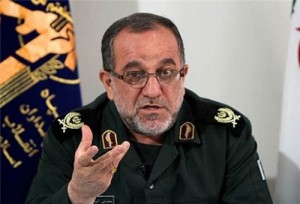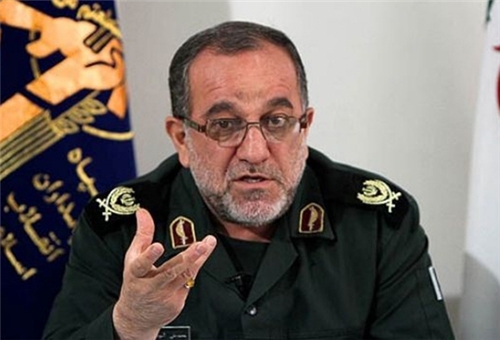 TEHRAN (FNA)- The Iranian Supreme Leader's Deputy Representative at the Islamic Revolution Guards Corps Brigadier General Mohammad Ali Asoudi�said the IRGC�s preparedness and deterrence power has caused the US Navy feel deep fright when crossing the Persian Gulf and the Sea of Oman.
TEHRAN (FNA)- The Iranian Supreme Leader's Deputy Representative at the Islamic Revolution Guards Corps Brigadier General Mohammad Ali Asoudi�said the IRGC�s preparedness and deterrence power has caused the US Navy feel deep fright when crossing the Persian Gulf and the Sea of Oman.�The US is afraid of (its) presence in the Persian Gulf and the Sea of Oman and the IRGC is the cause of this fear,� Brigadier General Asoudi said in the Central city of Qazvin on Saturday.
The General further described the IRGC's obedience to the Supreme Leader and its powerful presence on all scenes as the underlying cause of its power.
He reiterated that the enemy will be disappointed as long as the Iranian nation and the IRGC follow the footpath of the Supreme Leader of the Islamic Revolution Ayatollah Seyed Ali Khamenei.
Earlier in the day, Vice-Speaker of the Iranian Parliament Mohammad Hassan Aboutorabi-Fard underlined that the �US will not� dare to attack Iran, because it can neither estimate nor account for the costs of such a war.
Aboutorabi-Fard�s remarks came as some US officials have maintained their war rhetoric against Iran in the last few years even amid fruitful international diplomatic efforts to resolve the decade-long nuclear standoff between the two sides.
Addressing a meeting in Qazvin, the Iranian vice-speaker pointed to the US war rhetoric against Iran, and said, �The US cannot reckon the costs of a future aggression against Iran.�
�Today we owe our security to the great work of the Iranian nation, and the enemies do not dare to attack Iran,� Aboutorabi-Fard said.
He said Iran's security was indebted to the resistance of the Iranian nation and the leadership of (Supreme Leader of the Islamic Revolution Ayatollah Seyed Ali Khamenei) as well as tight cooperation among the Armed Forces.
�We should realize that this military prowess should always be strengthened in order not to allow anyone to dare to wage an attack on our Islamic country,� Aboutorabi-Fard said.
In relevant remarks last week, Iranian Defense Minister Brigadier General Hossein Dehqan played down the recent US military threats against Iran as �very meaningless� to Iranians.Iranian Armed Forces Chief of Staff Major General Hassan Firouzabadi also dismissed the US officials� threats of military action against Iran as a �political bluff,� and said, �Iran is ready for the decisive battle against the US and Israel.�
The Harvard University�s Kennedy School of Government has calculated the decade-long American wars in Afghanistan and Iraq would end up costing as much as $6trln, the equivalent of $75,000 for every American household.
When President George Bush�s National Economic Council Director, Lawrence Lindsey, had told the country�s largest newspaper �The Wall Street Journal� that the war would cost between $100bln and $200bln, he had found himself under intense fire from his colleagues in the administration who claimed that this was a gross overestimation.
Consequently, Lawrence Lindsey was forced to resign. It is also imperative to recall that the Bush administration had claimed at the very outset that the Iraq war would finance itself out of Iraqi oil revenues, but Washington DC had instead ended up borrowing some $2trln to finance the two wars, the bulk of it from foreign lenders, the Islam Times reported.
According to the Harvard University�s Kennedy School of Government 2013 report, this accounted for roughly 20 percent of the total amount added to the US national debt between 2001 and 2012.
According to the report, the US �has already paid $260bln in interest on the war debt,� and future interest payments would amount to trillions of dollars. This Harvard University report has also been carried on its website by the Centre for Research on Globalization, which is a widely-quoted Montreal-based independent research and media organization.
In its report under review, the 377-year old Harvard University has viewed that these afore-mentioned wars had not only left the United States heavily indebted, but would also have a profound impact on the federal government�s fiscal and budgetary crises over a protracted period.
The report has attributed the largest share of the trillions of dollars in continuing costs to care and compensation for hundreds of thousands of troops left physically and psychologically damaged by the two wars being discussed here.
In its conclusion, the report not only seeks to dispel illusions that ending full-scale wars in Iraq and Afghanistan would produce any kind of �peace dividend� that could help ameliorate conditions of poverty, unemployment and declining living standards for working people in the US itself, but makes it clear that the legacy of decisions made during the Iraq and Afghanistan conflicts would impose significant long-term costs on the federal government for many years to come.
By Fars News Agency
The Iran Project is not responsible for the content of quoted articles.











